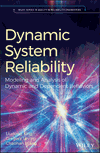Probabilistic Common-Cause Failure
Summary
Probabilistic common-cause failures (PCCFs) may contribute significantly to the overall system failure and thus the system unreliability. This chapter discusses the reliability modeling of PCCFs in single-phase systems and multi-phase systems, where the occurrence of a root cause results in failures of multiple system components with different probabilities. It presents explicit and implicit methodologies of evaluating system unreliability. The explicit method requires expanding the system reliability model to explicitly consider effects of PCCFs. It involves a straightforward two-step procedure. However, the explicit method can become computationally expensive for large-scale systems. The implicit method requires no expansion on the system reliability model and allows parallel evaluation of independent subproblems. The implicit method has lower requirements in both space and time than the explicit method. Both methods are applicable to arbitrary types of component time-to-failure distributions.



